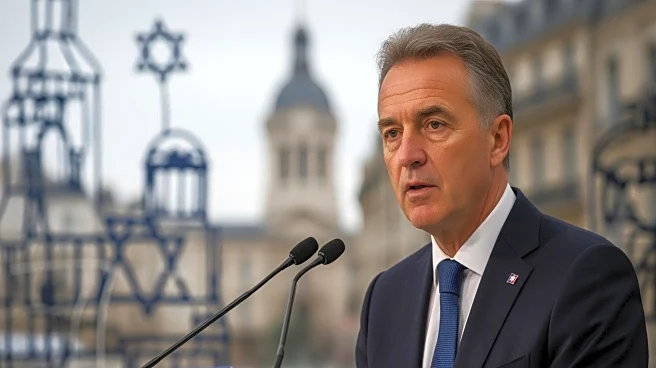What's Happening?
Arthur Essebag, a prominent French-Jewish television and radio host, has released a new book titled 'I Lost a Bedouin in Paris,' detailing his experiences and emotional turmoil following the events of
October 7, 2023. Essebag expresses disillusionment with the lack of solidarity from French society and peers, particularly in response to the massacre of Jews, which he describes as the worst since the Holocaust. He recounts his visits to Israel under rocket fire and reflects on the Jewish community's struggles with antisemitism and societal silence. Essebag's book serves as a personal narrative and a call for empathy and understanding towards the Jewish community in France.
Why It's Important?
Essebag's revelations highlight the ongoing challenges faced by the Jewish community in France, including antisemitism and societal indifference. His book underscores the emotional and physical security concerns that many French Jews experience, such as changing names on apps and removing religious symbols for safety. The broader significance lies in the potential for increased awareness and dialogue about antisemitism and the need for societal support and empathy. Essebag's public stance may encourage other public figures to address these issues, potentially influencing public policy and societal attitudes towards minority communities.
What's Next?
Essebag's book may spark discussions within French society and the entertainment industry about the treatment and perception of the Jewish community. It could lead to increased advocacy for Jewish rights and safety, as well as calls for more inclusive and empathetic societal responses to minority issues. The book's impact might also extend to influencing public figures and policymakers to address antisemitism more robustly, potentially leading to legislative or community-based initiatives aimed at improving the security and integration of Jewish citizens in France.
Beyond the Headlines
Essebag's narrative raises ethical questions about the role of public figures in advocating for minority rights and the responsibilities of societies to protect vulnerable communities. It also touches on the cultural dimensions of identity and belonging, as Essebag navigates his dual identity as French and Jewish. The book may contribute to long-term shifts in how minority communities are perceived and supported in France, fostering a more inclusive and empathetic cultural landscape.









